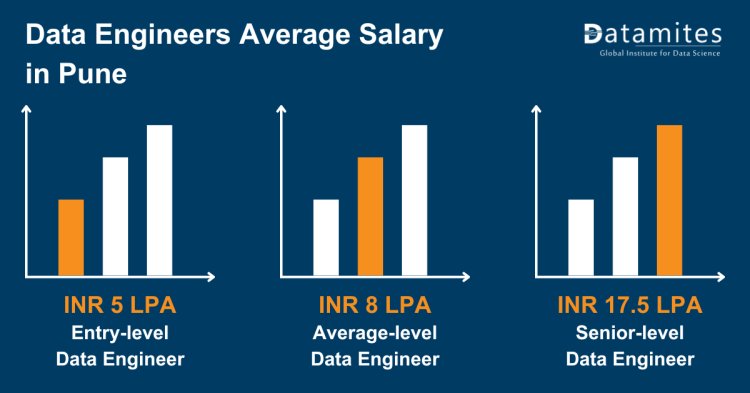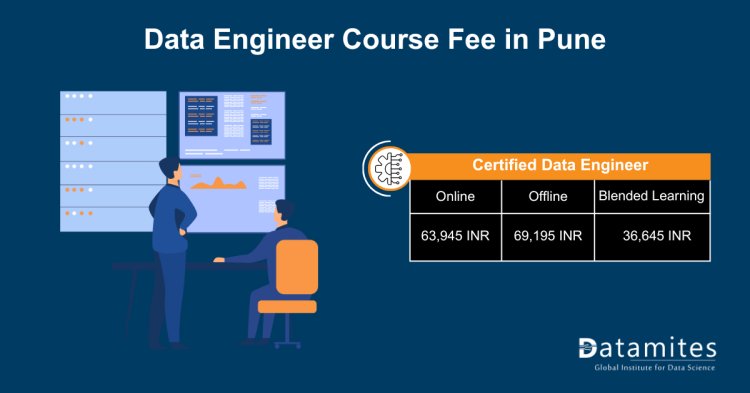Data Engineer Course Fee in Pune
Explore the Data Engineer course in Pune, designed to equip you with the skills needed to thrive in the field of data engineering. Learn from industry experts and gain hands-on experience with the latest tools and technologies.

As the world becomes increasingly data-driven, the demand for skilled data engineers continues to surge. Pune, known as the thriving hub of technology and education in India, is witnessing a parallel growth in the number of institutions offering data engineering courses. However, for aspiring data engineers, one of the critical considerations is the cost involved in pursuing such courses.
According to a report by Mordor Intelligence, the Big Data Engineering Services Market is estimated to be worth around USD 79.34 billion in 2024. Projections suggest that it will witness significant growth, reaching approximately USD 162.22 billion by 2029, with a forecasted growth rate of 15.38% during the period from 2024 to 2029.
In this article, we'll delve into the landscape of data engineer course fees in Pune, offering insights and guidance for those on the path to mastering this vital skill set.
Data Engineering: Introduction and Basic Concepts
Data engineering is a critical discipline within the realm of data science and analytics. It involves the collection, processing, and storage of data in a format that is accessible and useful for analysis. Data engineers are responsible for designing, building, and maintaining the infrastructure that enables efficient data flow within an organization. This includes developing pipelines to extract data from various sources, transforming it into a consistent format, and loading it into databases or data warehouses.
Key concepts in data engineering include data ingestion, data processing, data modeling, and data integration. By ensuring the reliability and scalability of data infrastructure, data engineers play a crucial role in enabling data-driven decision-making and insights for businesses.
Refer these below articles:
- Navigating the Distinctive Paths of Data Architects and Data Engineers
- Difference Between Data Scientist and Data Engineer
- Data Engineer vs Data Analyst
Role of a Data Engineer and Key Responsibilities
A Data Engineer plays a crucial role in designing, building, and maintaining the infrastructure that allows for the storage, processing, and analysis of large volumes of data. Their responsibilities often include:
- Data Pipeline Development: Building and maintaining scalable, efficient data pipelines to ingest, process, and transform data from various sources (such as databases, APIs, logs, and IoT devices) into usable formats for analysis.
- Data Warehousing: Designing and implementing data warehouse solutions for storing structured and unstructured data efficiently. This involves selecting appropriate database technologies, schema design, indexing, partitioning, and optimization.
- Data Modeling and Schema Design: Developing and maintaining data models and schemas that support the organization's analytical and reporting needs. This may involve understanding business requirements, designing dimensional models for data warehouses, and ensuring data integrity and consistency.
- Data Integration: Integrating data from disparate sources and formats, ensuring consistency, accuracy, and reliability. This may involve data cleansing, normalization, and transformation to ensure data quality.
- Data Governance and Security: Implementing data governance policies and procedures to ensure data quality, integrity, and compliance with regulatory requirements. This includes managing access controls, encryption, and auditing mechanisms to protect sensitive data.
- Performance Optimization: Monitoring and optimizing data processing and query performance to ensure efficient use of resources and timely delivery of insights. This may involve tuning database configurations, optimizing ETL processes, and implementing caching and indexing strategies.
- Big Data Technologies: Working with big data technologies such as Hadoop, Spark, Kafka, and distributed computing frameworks to process and analyze large-scale datasets efficiently.
- Real-time Data Processing: Building real-time data processing systems for streaming data sources, enabling timely decision-making and actionable insights.
- Collaboration with Data Scientists and Analysts: Collaborating with data scientists, analysts, and other stakeholders to understand their data requirements, provide them with access to relevant data, and support them in developing and deploying analytical models and reports.
How to Become a Data Engineer in Pune?
Becoming a Data Engineer in Pune, or anywhere else, typically involves a combination of education, practical experience, and continuous learning. Here's a general roadmap you can follow to pursue a career as a Data Engineer in Pune:
- Educational Background: Obtain a bachelor's degree in a relevant field such as Computer Science, Information Technology, Mathematics, Statistics, or Engineering. Some positions may require a master's degree or higher education in Data Science, Computer Engineering, or a related field.
- Gain Proficiency in Programming: Develop strong programming skills in languages commonly used in data engineering such as Python, Java, Scala, or SQL. Additionally, familiarity with scripting languages like Bash can be beneficial.
- Learn Data Engineering Technologies and Tools: Familiarize yourself with data engineering technologies and tools such as Apache Hadoop, Apache Spark, Apache Kafka, Apache Airflow, SQL databases (e.g., PostgreSQL, MySQL), NoSQL databases (e.g., MongoDB, Cassandra), and cloud platforms (e.g., AWS, Google Cloud Platform, Azure).
- Master Data Processing and ETL: Understand data processing techniques, including Extract, Transform, Load (ETL) processes, data warehousing concepts, data modeling, and schema design. Gain experience in building data pipelines to ingest, process, and transform data from various sources.
- Develop Database Skills: Learn about relational and non-relational databases, including database design, querying, optimization, and administration. Practice working with databases to store and retrieve data efficiently.
- Acquire Data Visualization Skills: Familiarize yourself with data visualization tools and libraries such as Tableau, Power BI, Matplotlib, or ggplot2. Being able to create visualizations and reports to communicate insights effectively is important in data engineering roles.
- Build a Portfolio: Create projects or contribute to open-source projects that showcase your data engineering skills and experience. This could involve designing and implementing data pipelines, optimizing data processing workflows, or solving real-world data challenges.
- Gain Practical Experience: Seek internships, co-op programs, or entry-level positions in data engineering or related fields to gain practical experience and exposure to real-world projects and workflows.
- Networking and Professional Development: Join data engineering communities, attend meetups, conferences, and workshops to network with professionals in the field and stay updated on emerging technologies and best practices.
- Continuous Learning: Data engineering is a rapidly evolving field, so it's essential to stay updated on new technologies, tools, and techniques. Engage in continuous learning through online courses, tutorials, books, and certifications to enhance your skills and knowledge.
Read these below articles:
- How much is the Data Engineer Course Fee in Gurgaon?
- How much is the Data Engineer Course Fee in Vijayawada?
- How much is the Data Engineer Course Fee in Warangal?
Salaries of Data Engineers in Pune
The salaries of Data Engineers in Pune, India can vary based on factors such as experience, skills, and the specific industry or company. Here's a general breakdown of entry-level, average, and senior-level salaries:
- Entry-level Salary: Typically, entry-level Data Engineers in Pune can expect to earn around ₹5,00,000 per annum according to a Glassdoor report. These individuals may have little to no prior work experience in the field and may be recent graduates with relevant qualifications such as a degree in computer science or data engineering.
- Average Salary: The average salary for Data Engineers in Pune usually falls in the range of ₹8,00,000 per annum according to a Glassdoor report. Professionals at this level have gained some practical experience in data engineering, including working with various data tools and technologies.
- Senior-level Salary: The salary of Senior Data Engineers in Pune ranges from ₹17.5 LPA according to the Ambition Box report. These individuals typically have strong technical skills, leadership capabilities, and may have managed complex data engineering projects or teams.

Data Engineer Course Fee in Pune
The cost of a data engineering course in Pune can fluctuate significantly, contingent upon various factors such as the institution offering the course, its duration, the course level (beginner, intermediate, advanced), and the delivery mode (online, in-person, hybrid). The data engineering course fees in Pune typically span from INR 30,000 to INR 2,50,000 per year, reflecting the diverse options available to prospective students.
DataMites, a renowned international institution, provides the Certified Data Engineer program in Pune. Committed to offering outstanding education at competitive prices, our training fees for the Certified Data Engineer course in Pune vary depending on the training mode selected by students.
- The online data engineer course fee in Pune ranges from INR 63,945.
- The offline data engineer cours fee in Pune ranges from INR 69,195.
- For blended learning, the certified data engineer course fee in Pune ranges from INR 36,645.

Factors Influencing Course Fees:
Several factors contribute to the determination of data engineer course fees in Pune:
- Institution Reputation: Established universities and institutions with a strong track record in data science and engineering education often charge higher fees due to their credibility and quality of instruction.
- Course Content and Duration: Courses that cover a broader range of topics and have longer durations tend to command higher fees. These programs often provide in-depth knowledge and hands-on experience, which justify the higher investment.
- Faculty Expertise: Courses led by industry experts or renowned academics may have higher fees, reflecting the value associated with learning from experienced professionals.
- Infrastructure and Facilities: Institutions offering state-of-the-art infrastructure, access to cutting-edge tools and technologies, and practical hands-on labs may charge higher fees to cover these amenities.
- Placement Assistance and Industry Connections: Courses that provide robust placement assistance, internships, or industry networking opportunities may justify higher fees by enhancing students' career prospects.
- Certification and Accreditation: Accredited courses or those offering recognized data engineer certifications in Pune may have higher fees, as they carry more weightage in the job market and industry.
Also refer these below articles:
- How to Become a Data Engineer in India?
- How to Become a Data Engineer in Bangalore?
- How to Become a Data Engineer in Chennai?
Data engineering courses in Pune offer a multitude of options catering to diverse preferences and budgets. By understanding the factors influencing course fees and assessing the value proposition of different programs, aspiring data engineers can make informed decisions that align with their career aspirations and financial considerations. Ultimately, investing in quality education and skill development is pivotal in navigating the dynamic landscape of data engineering and securing rewarding career opportunities in the ever-evolving tech industry.
DataMites welcomes aspiring individuals aiming for a career as data engineers in Pune to enroll in our extensive data engineer training in Pune. Our offline courses are conveniently situated at Khardi and Baner, ensuring accessibility for all learners. Whether you're an experienced professional or a novice, our courses are tailored to cater to your requirements. Don't miss this chance to explore the dynamic field of data engineering and uncover its limitless possibilities in shaping the future.
DataMites Training Institute offers a globally recognized Data Engineer Course, empowering learners with essential data engineering skills. The course covers Python, Big Data, SQL, Data Wrangling, and Pandas, providing practical, hands-on training for real-world scenarios. Accredited by IABAC, it offers an industry-recognized certification that boosts career growth. With expert guidance and job support, DataMites helps professionals excel in the data-driven industry.
